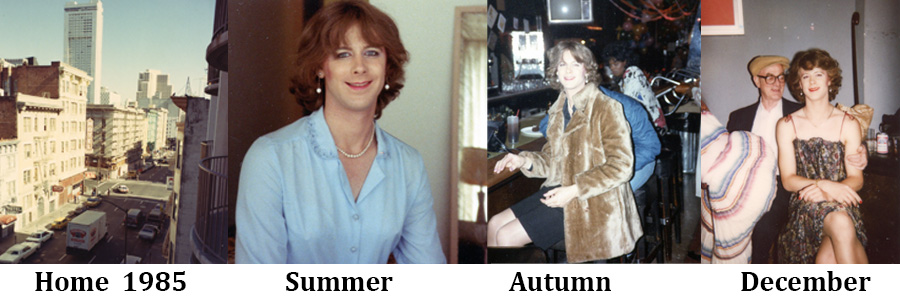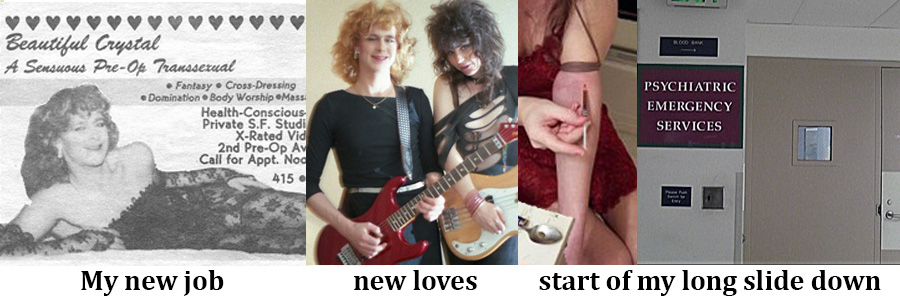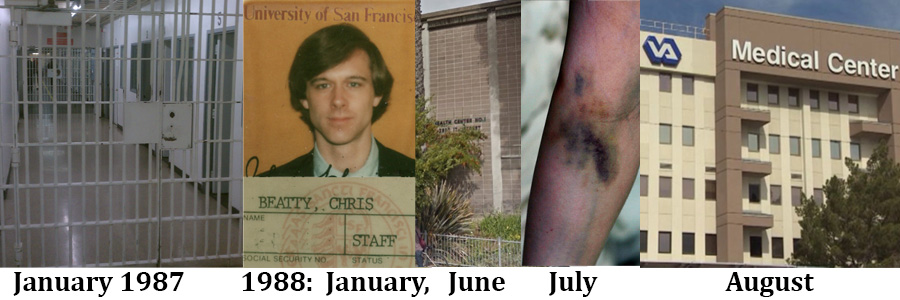In May of 1985 I moved to San Francisco's notorious Tenderloin, the "TL," twenty blocks of drugs, hookers,
poverty and crime, and also where most poor transwomen lived. My new friend Misty from the Spirit Club took me to her
doctor for estrogen injections and hormone pills - the free SF clinic required six months evaluation
and I was desperate to become a woman now that I knew the truth about myself. I took a new name: Pamela.
I started painful, expensive electrolysis that I despaired would take forever to complete. My greatest fear was never looking good enough as a woman. For months I went out as Pamela only at night and almost always to the Spirit Club. The alternative bar was the Black Rose, where the most beautiful trans hung out and the pros turned tricks. I always felt so ugly in there. I would never be as pretty as them!
Seldom did the world receive Pamela well. Strangers mocked and cursed me. I was isolated from my family and lost my few friends. Meanwhile I needed only two more classes to earn my AA degree. I cleaned houses by day and attended class at night. I dabbled in prostitution, which paid far better than maid work; it was also a rebellion against the straight world's rejection. By December the Black Rose was my new world.

When I went to college as Pamela even teachers openly smirked at me; it hurt worse than the abuse on the street. My grades suffered, but I held on to finish the semester and graduate with honors. I planned to live full-time as Pamela, keep improving my appearance, and prepare for the university. However, when I told my housecleaning agency I would start working as a woman, I was fired. I became a prostitute named Crystal.
After a short, ugly apprenticeship of bar and streetcorner whoring, I began lucrative incall-outcall prostitution. I threw myself into guitar and singing, and I looked musicians who'd accept me, unlike my former "friends." Eventually I met and fell in love with Nola, a so-so bass player and a highly intelligent and gifted artist. I'd seldom seen many transsexual women as beautiful as she. She was soulmate material.
I loved my exciting, (relatively) upscale callgirl career: the mostly easy money, "party favor" drugs, and the praise from my johns. They said I was beautiful and sexy—a welcome contrast to the daily abuse on the street. But I hated the bigotry and being denied my desired career in computers. Heroin made all that pain go away. I thought I'd found GOD. Smack and the oblivion of PCP (Angel Dust) made it seem better.

By late summer '86, I considered killing myself the way normal girls consider dieting. Instead, I stopped female hormones. De-transitioning was a self-betrayal brought intense depression and a week-long PCP ordeal landing me in Psych Emergency with all my beautiful hair cut off. Only Nola's love gave me a reason to live. I'd try to be her husband, get a computer job and we'd live happily ever after. I dearly hoped.
I had cowardly killed off the best part of me. I'd never known self-hatred like that. So when I tested positive for HIV I almost actually welcomed the news. Only Nola made me want to live. In December, 1986 I had a violent PCP blackout that mutilated my left hand and landed me in jail. I waited three months in county jail for a VA rehab that would take me, and the felony charges were eventually dropped.
In January of 1988, University of SF hired me as a computer programmer. I loved my job but desperately missed womanhood. My income afforded a massive heroin habit, and I soon lost that job. Then came near-death overdoses, failed detoxes, frequent withdrawls and contemplating real crime. Instead, I went into a new VA rehab and Nola went into a sober living. We were finally sick and tired of being sick and tired.

I started painful, expensive electrolysis that I despaired would take forever to complete. My greatest fear was never looking good enough as a woman. For months I went out as Pamela only at night and almost always to the Spirit Club. The alternative bar was the Black Rose, where the most beautiful trans hung out and the pros turned tricks. I always felt so ugly in there. I would never be as pretty as them!
Seldom did the world receive Pamela well. Strangers mocked and cursed me. I was isolated from my family and lost my few friends. Meanwhile I needed only two more classes to earn my AA degree. I cleaned houses by day and attended class at night. I dabbled in prostitution, which paid far better than maid work; it was also a rebellion against the straight world's rejection. By December the Black Rose was my new world.

When I went to college as Pamela even teachers openly smirked at me; it hurt worse than the abuse on the street. My grades suffered, but I held on to finish the semester and graduate with honors. I planned to live full-time as Pamela, keep improving my appearance, and prepare for the university. However, when I told my housecleaning agency I would start working as a woman, I was fired. I became a prostitute named Crystal.
After a short, ugly apprenticeship of bar and streetcorner whoring, I began lucrative incall-outcall prostitution. I threw myself into guitar and singing, and I looked musicians who'd accept me, unlike my former "friends." Eventually I met and fell in love with Nola, a so-so bass player and a highly intelligent and gifted artist. I'd seldom seen many transsexual women as beautiful as she. She was soulmate material.
I loved my exciting, (relatively) upscale callgirl career: the mostly easy money, "party favor" drugs, and the praise from my johns. They said I was beautiful and sexy—a welcome contrast to the daily abuse on the street. But I hated the bigotry and being denied my desired career in computers. Heroin made all that pain go away. I thought I'd found GOD. Smack and the oblivion of PCP (Angel Dust) made it seem better.

By late summer '86, I considered killing myself the way normal girls consider dieting. Instead, I stopped female hormones. De-transitioning was a self-betrayal brought intense depression and a week-long PCP ordeal landing me in Psych Emergency with all my beautiful hair cut off. Only Nola's love gave me a reason to live. I'd try to be her husband, get a computer job and we'd live happily ever after. I dearly hoped.
I had cowardly killed off the best part of me. I'd never known self-hatred like that. So when I tested positive for HIV I almost actually welcomed the news. Only Nola made me want to live. In December, 1986 I had a violent PCP blackout that mutilated my left hand and landed me in jail. I waited three months in county jail for a VA rehab that would take me, and the felony charges were eventually dropped.
In January of 1988, University of SF hired me as a computer programmer. I loved my job but desperately missed womanhood. My income afforded a massive heroin habit, and I soon lost that job. Then came near-death overdoses, failed detoxes, frequent withdrawls and contemplating real crime. Instead, I went into a new VA rehab and Nola went into a sober living. We were finally sick and tired of being sick and tired.

opens a new browser tab,
each with complex content.
� Christine D.Beatty
all rights reserved.